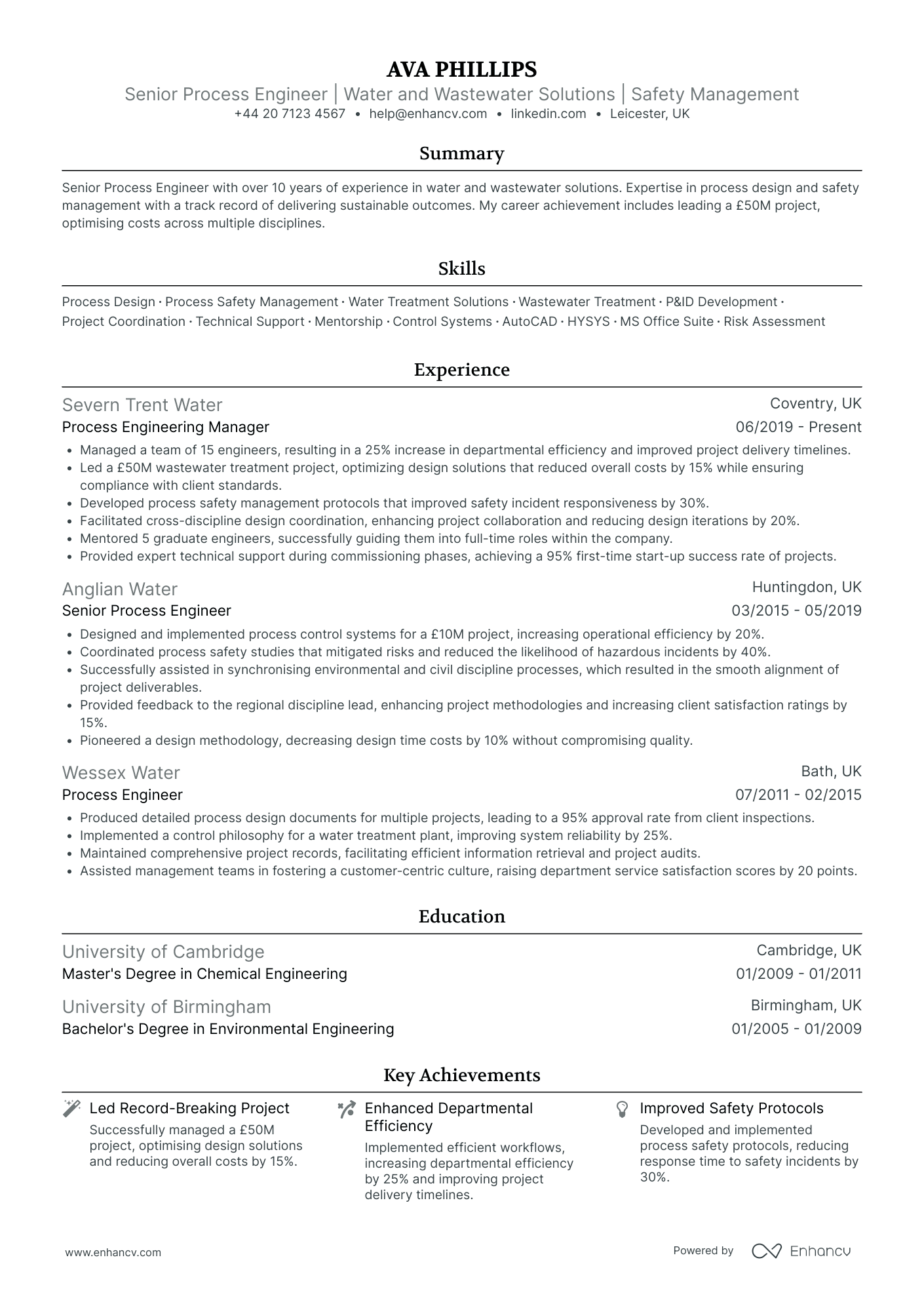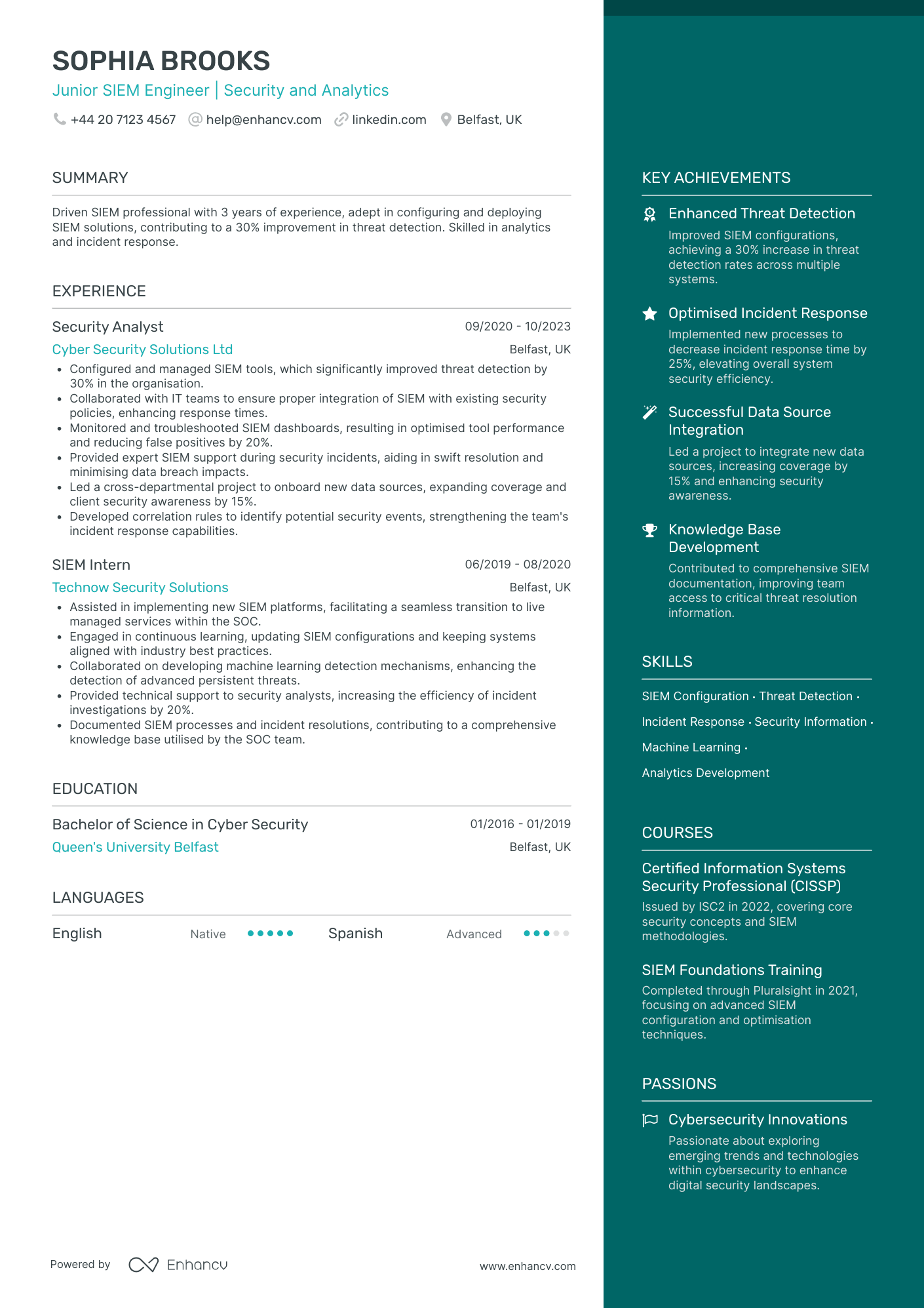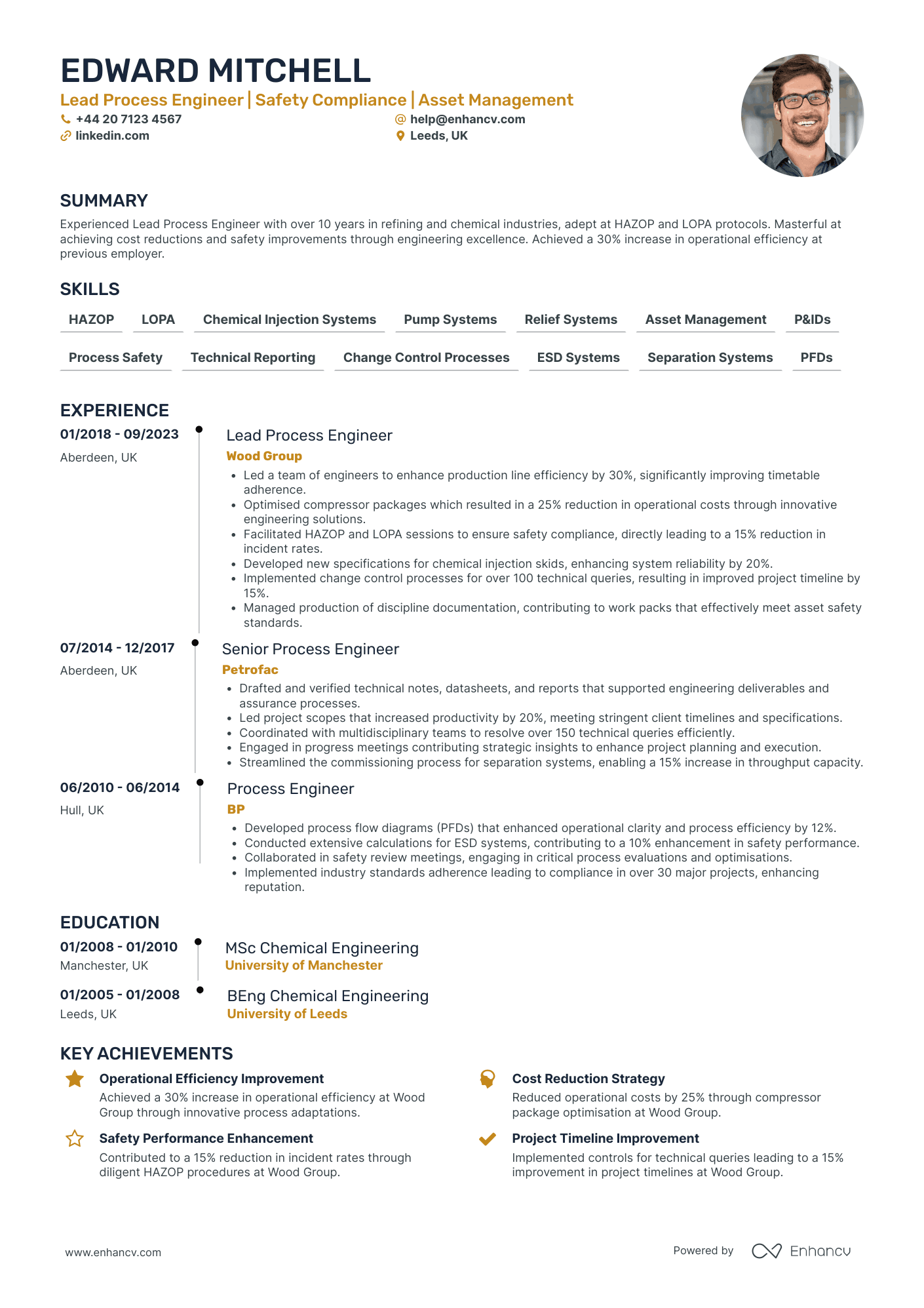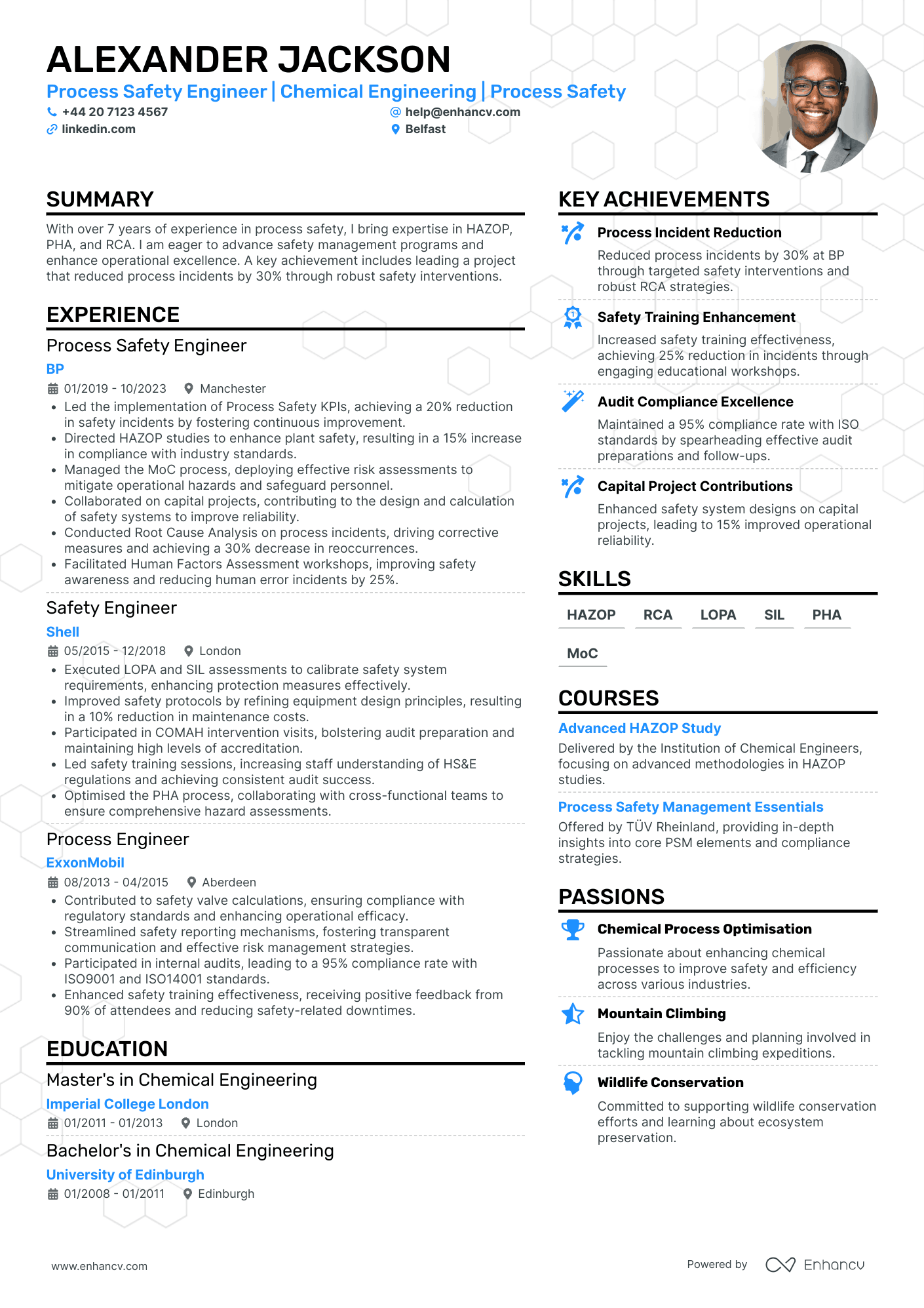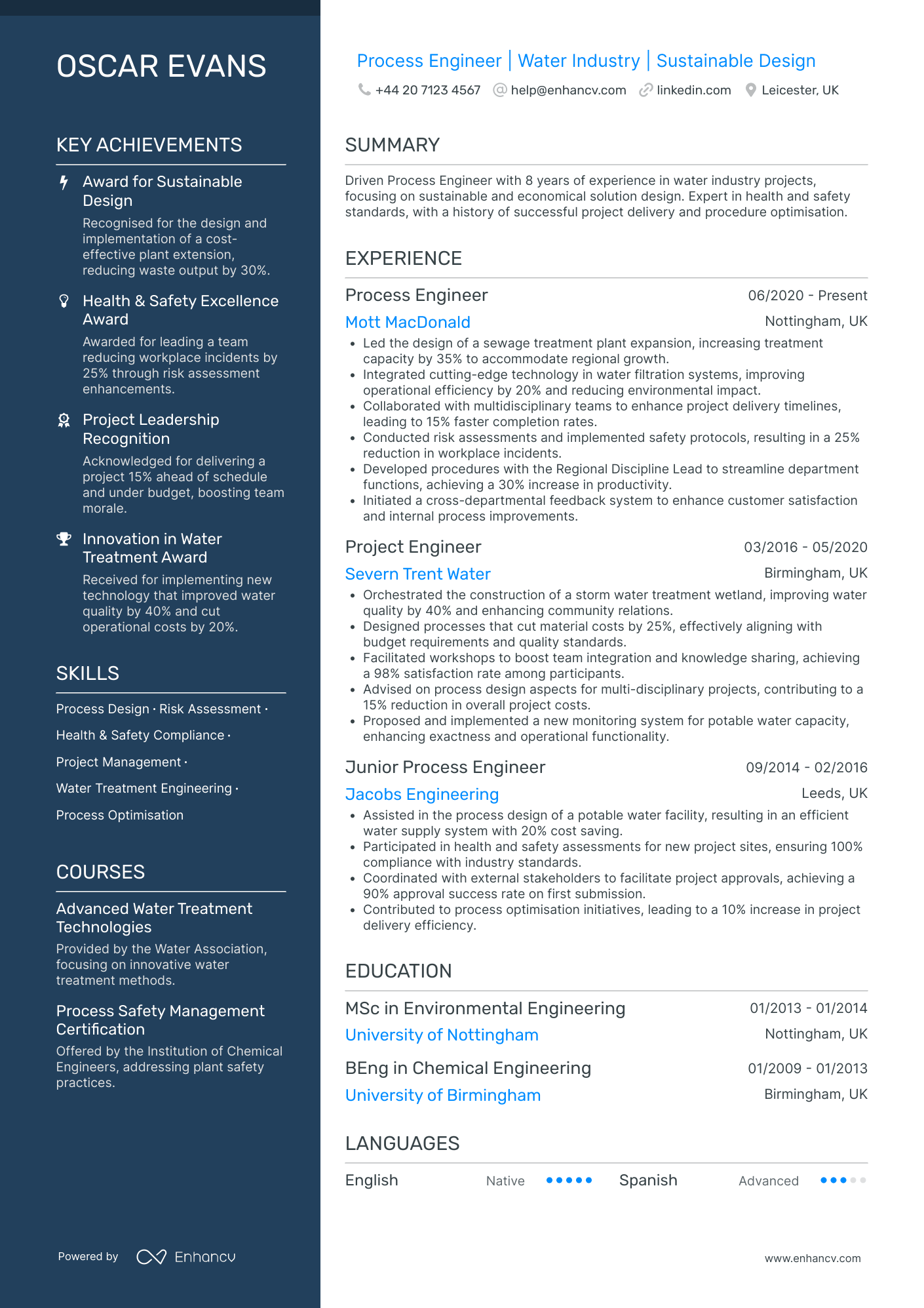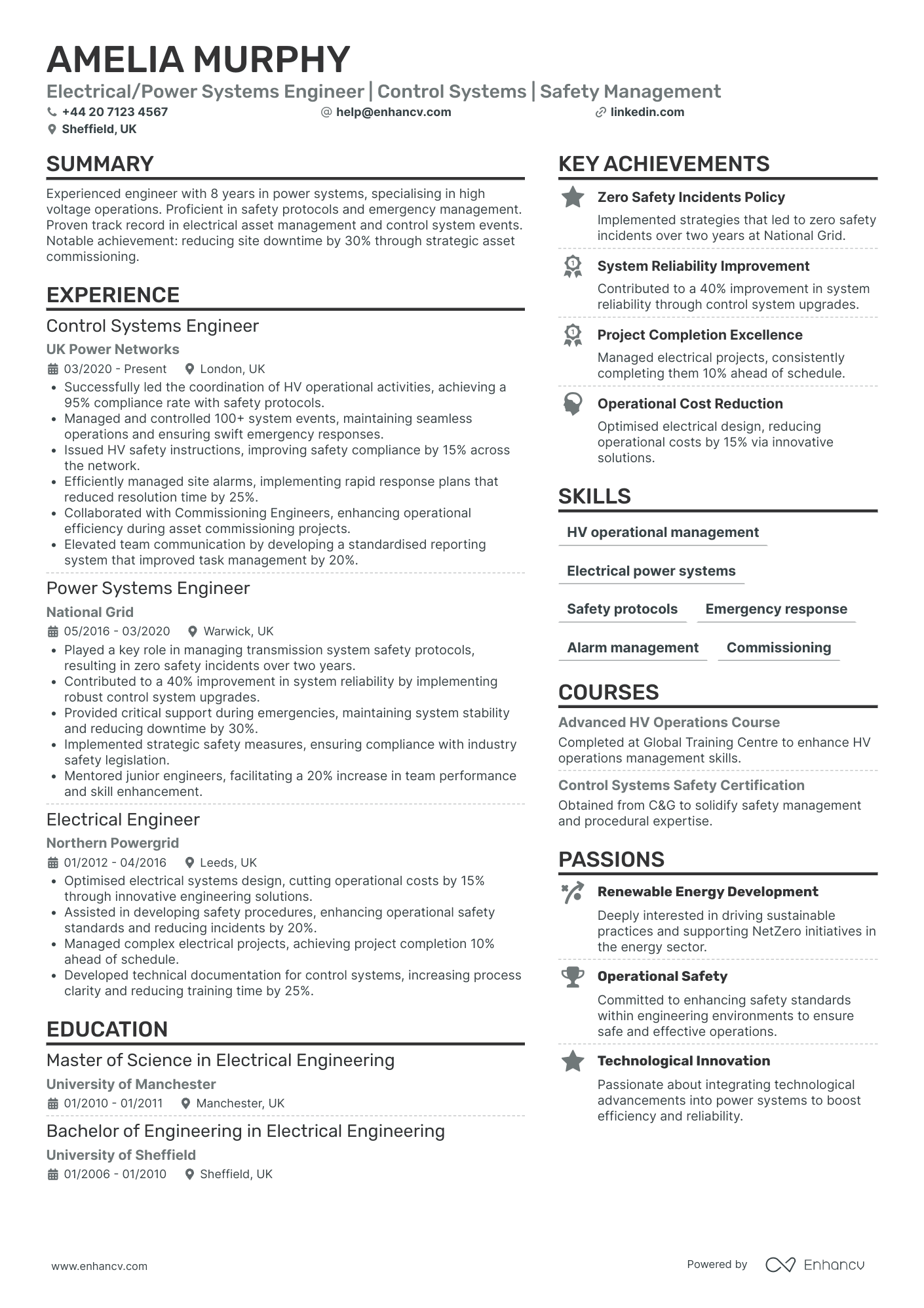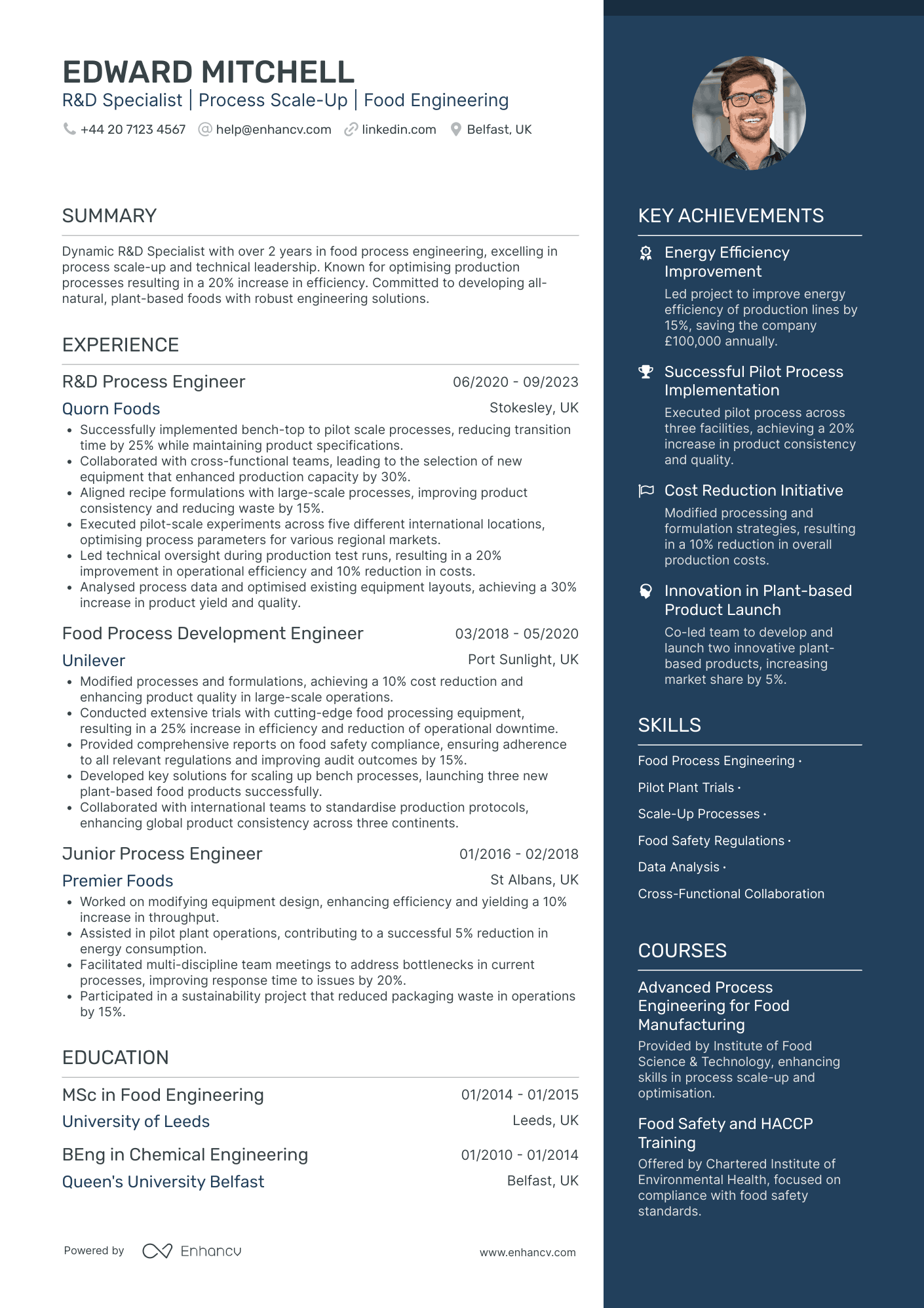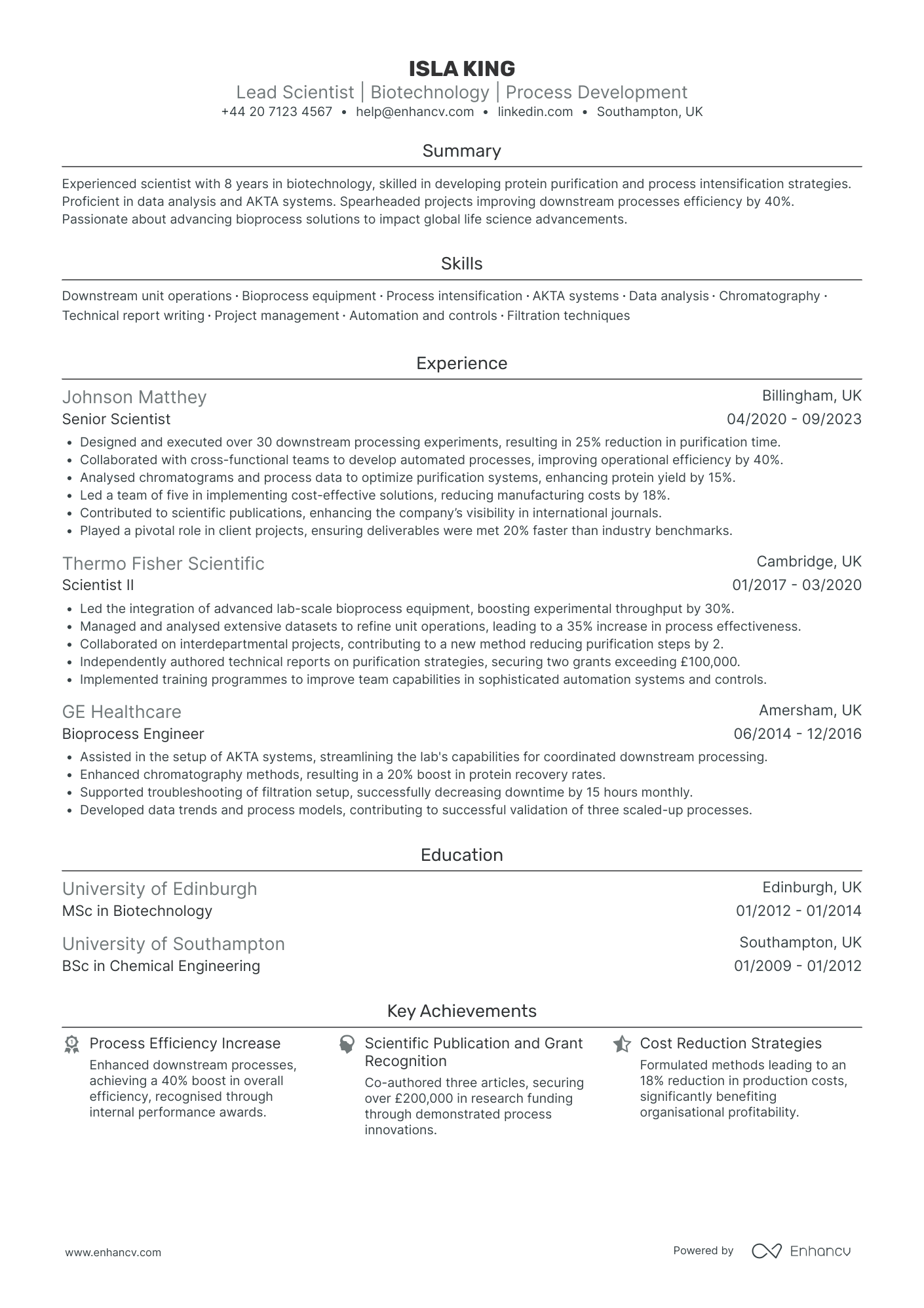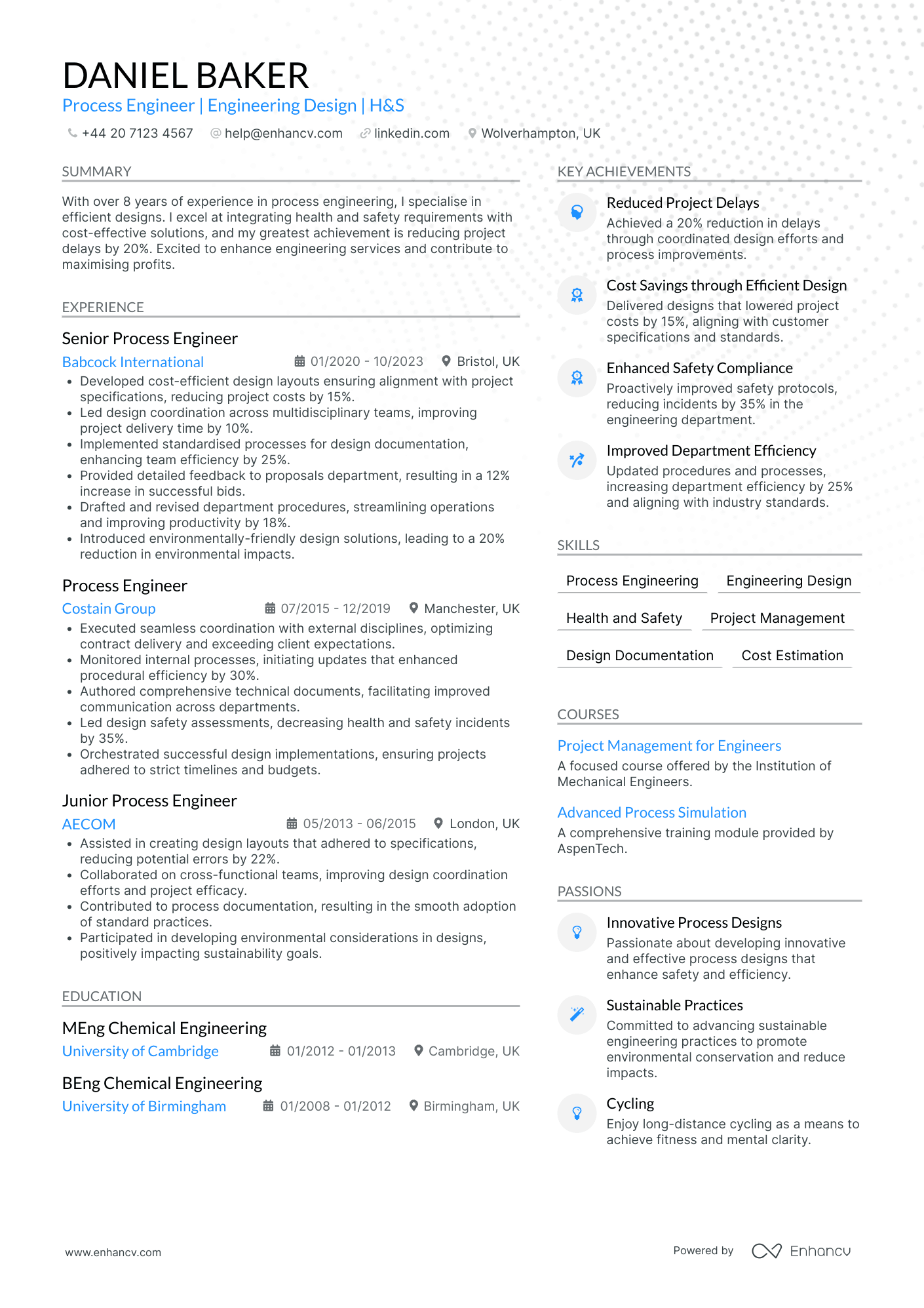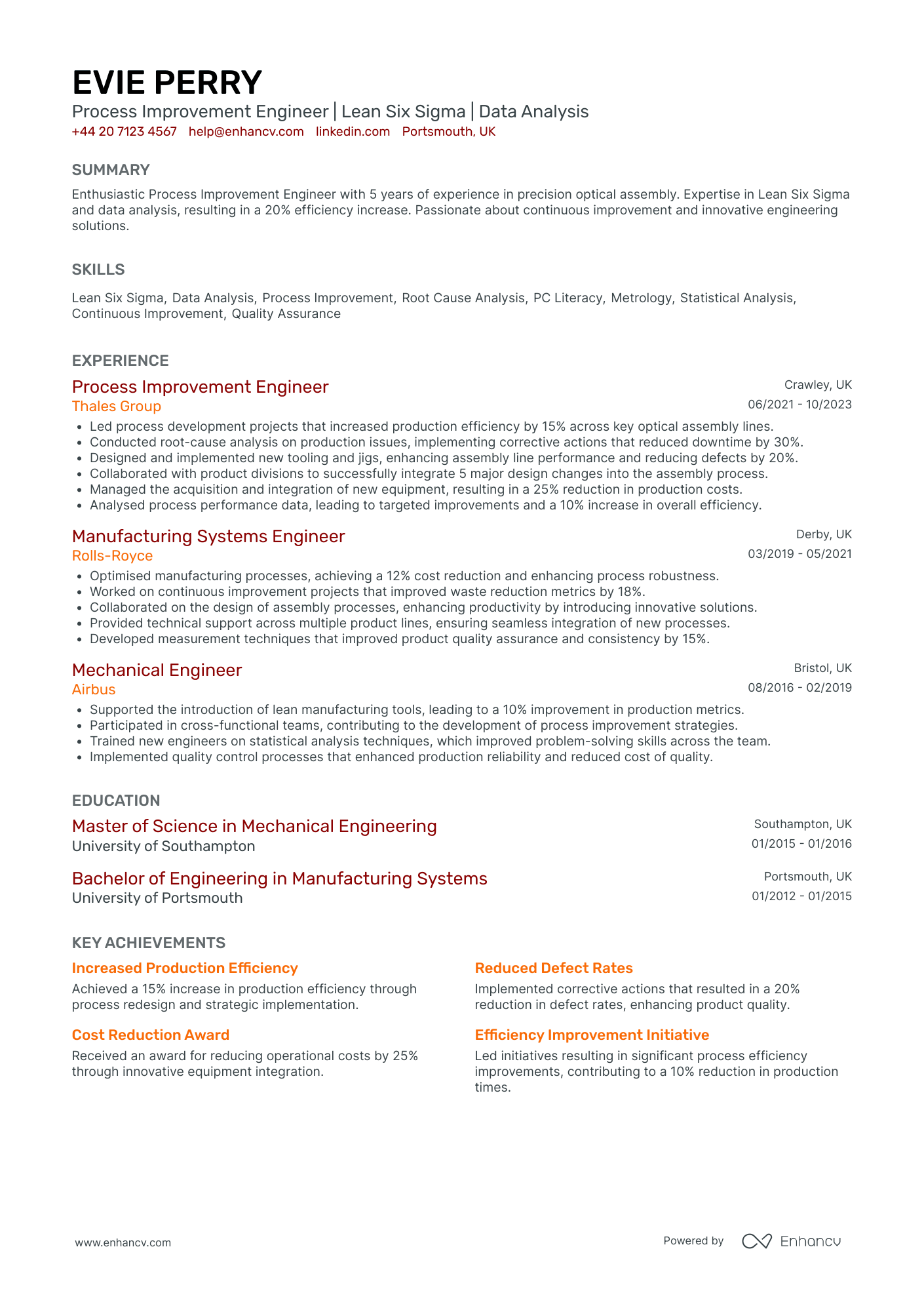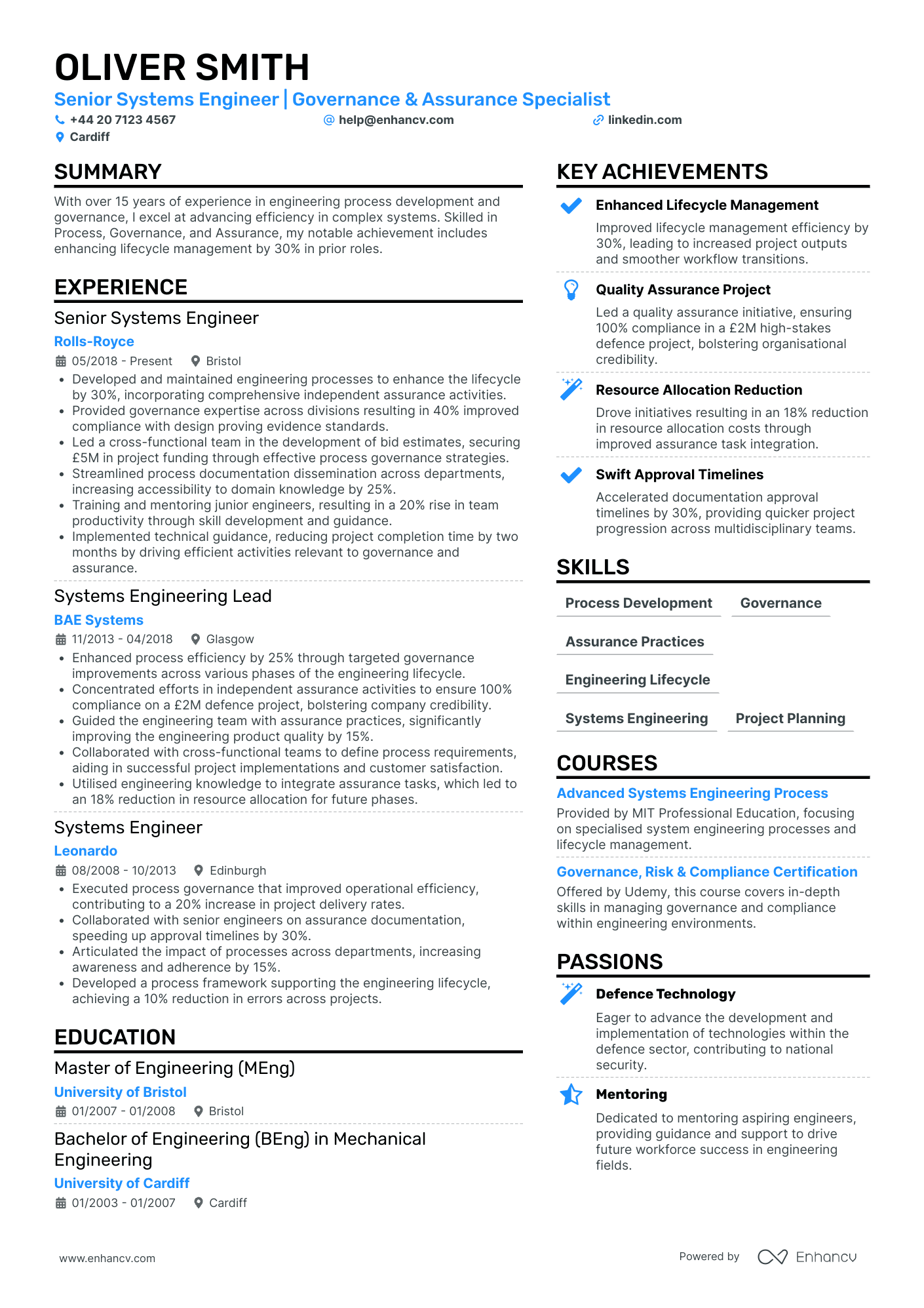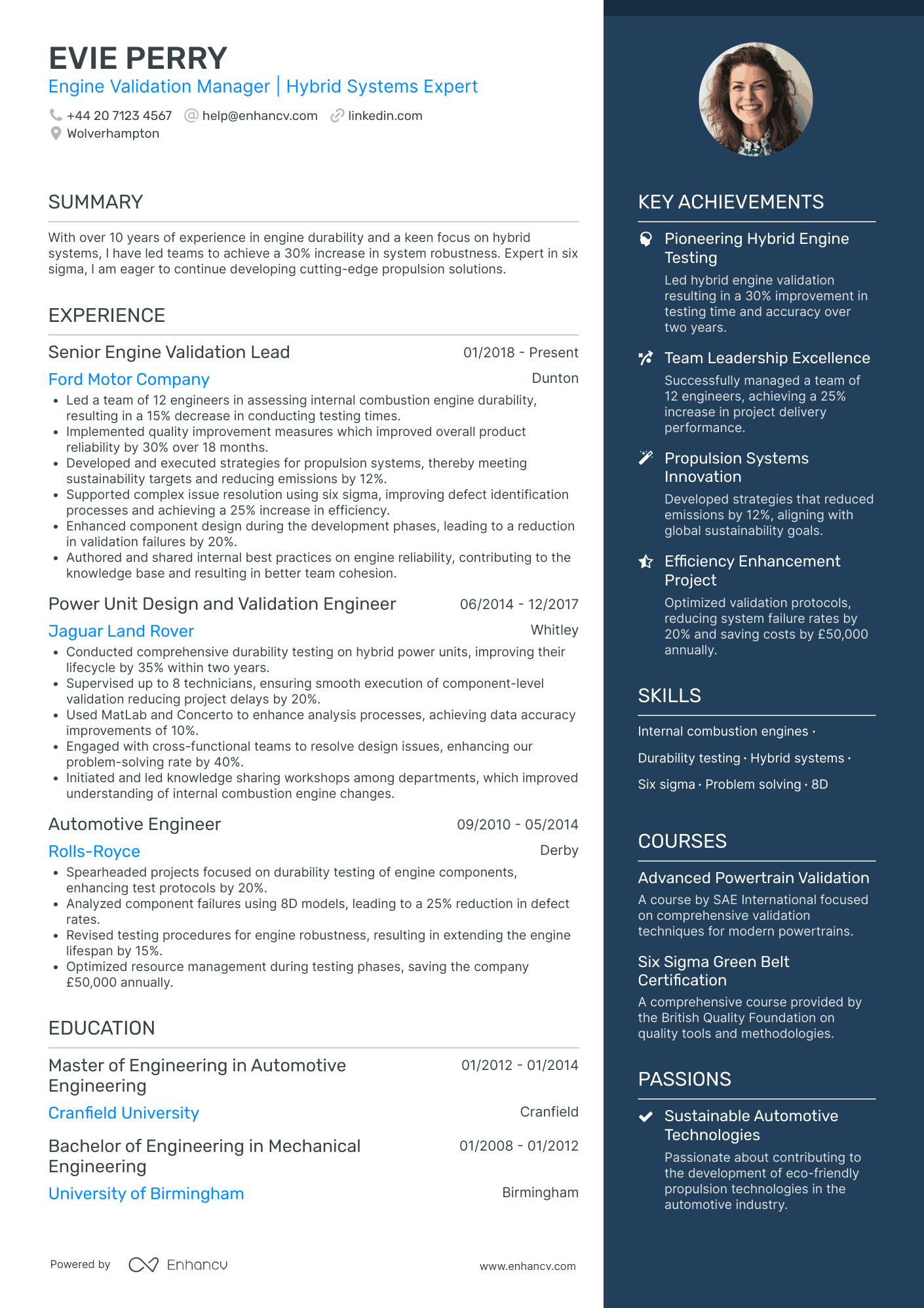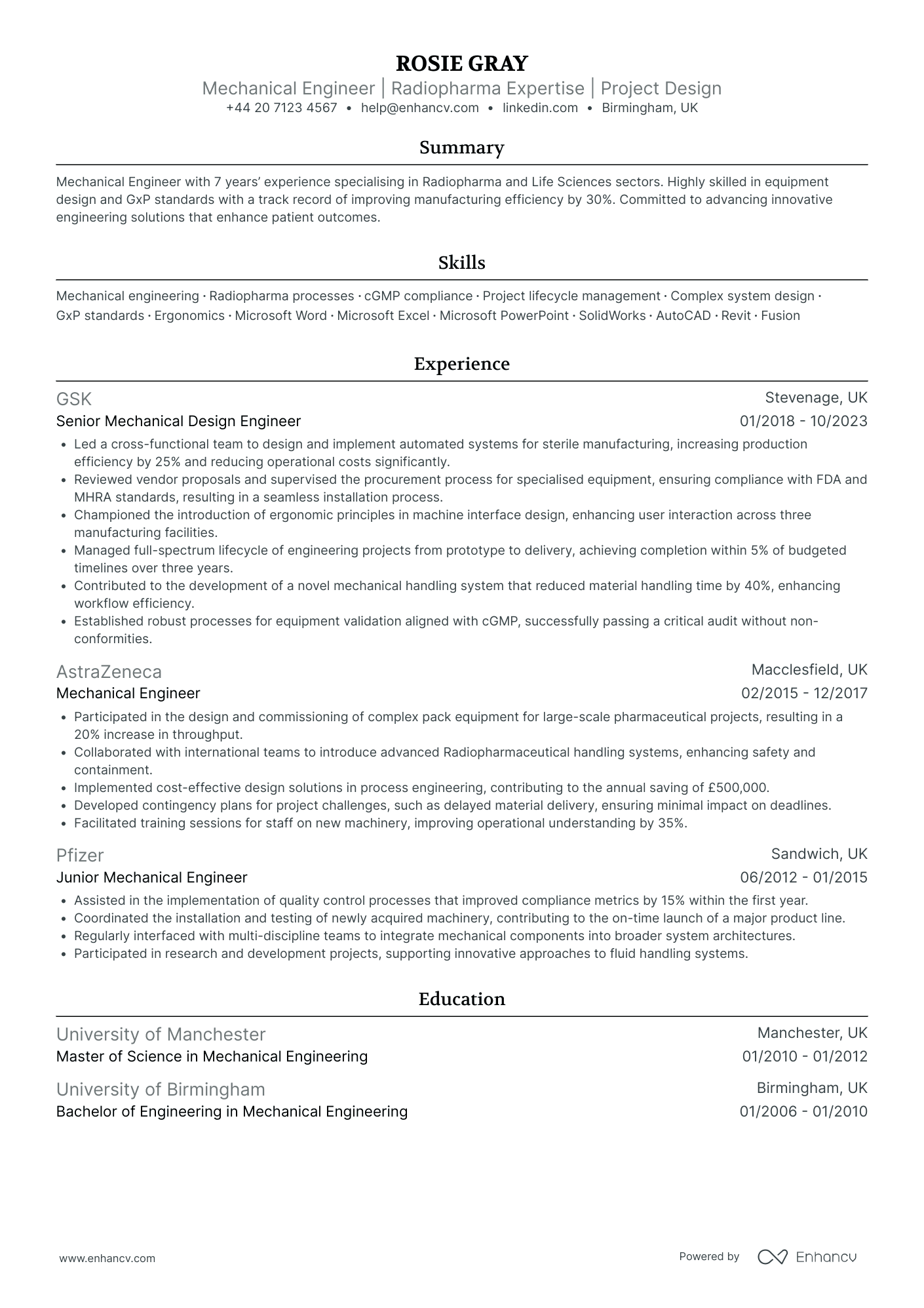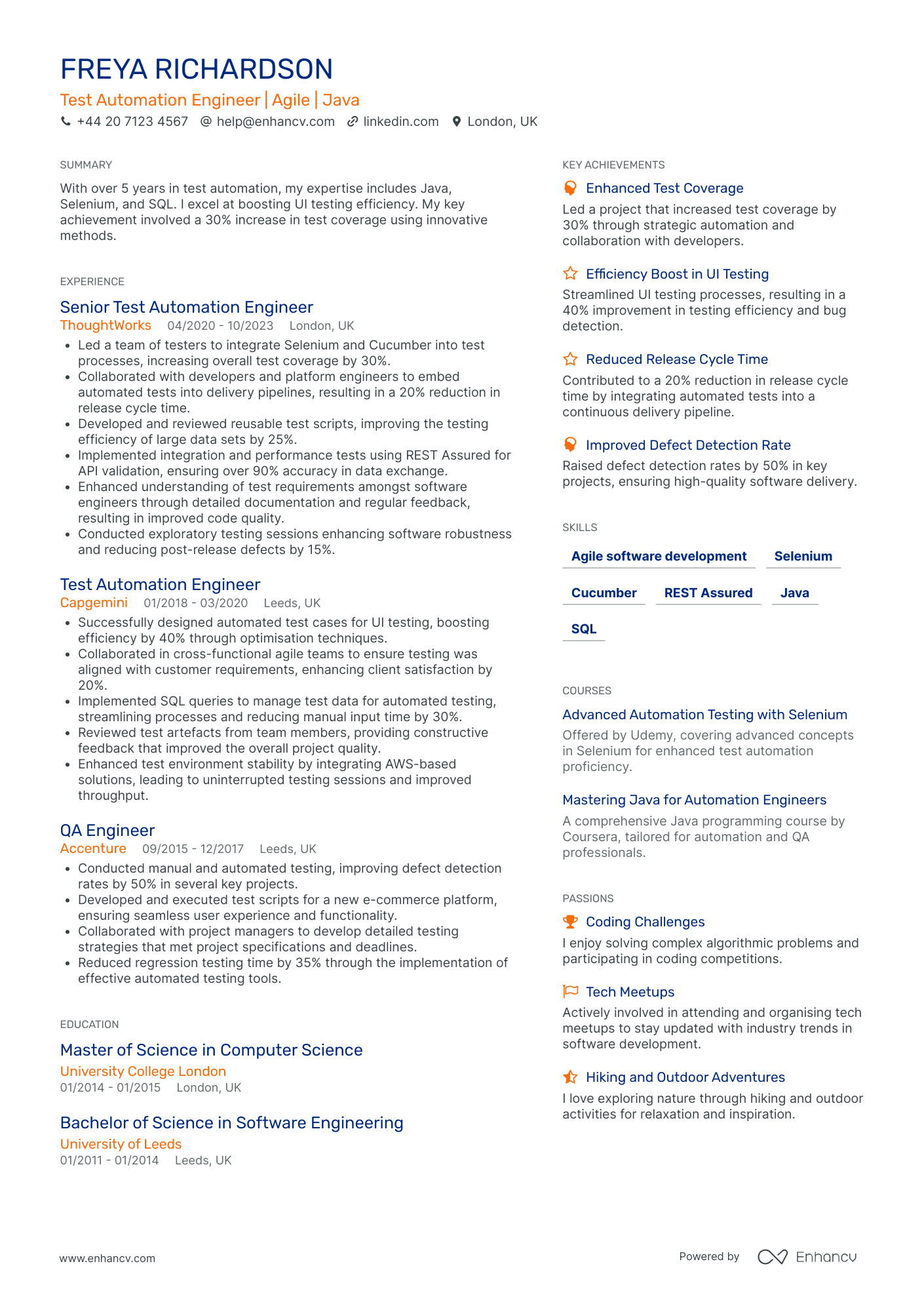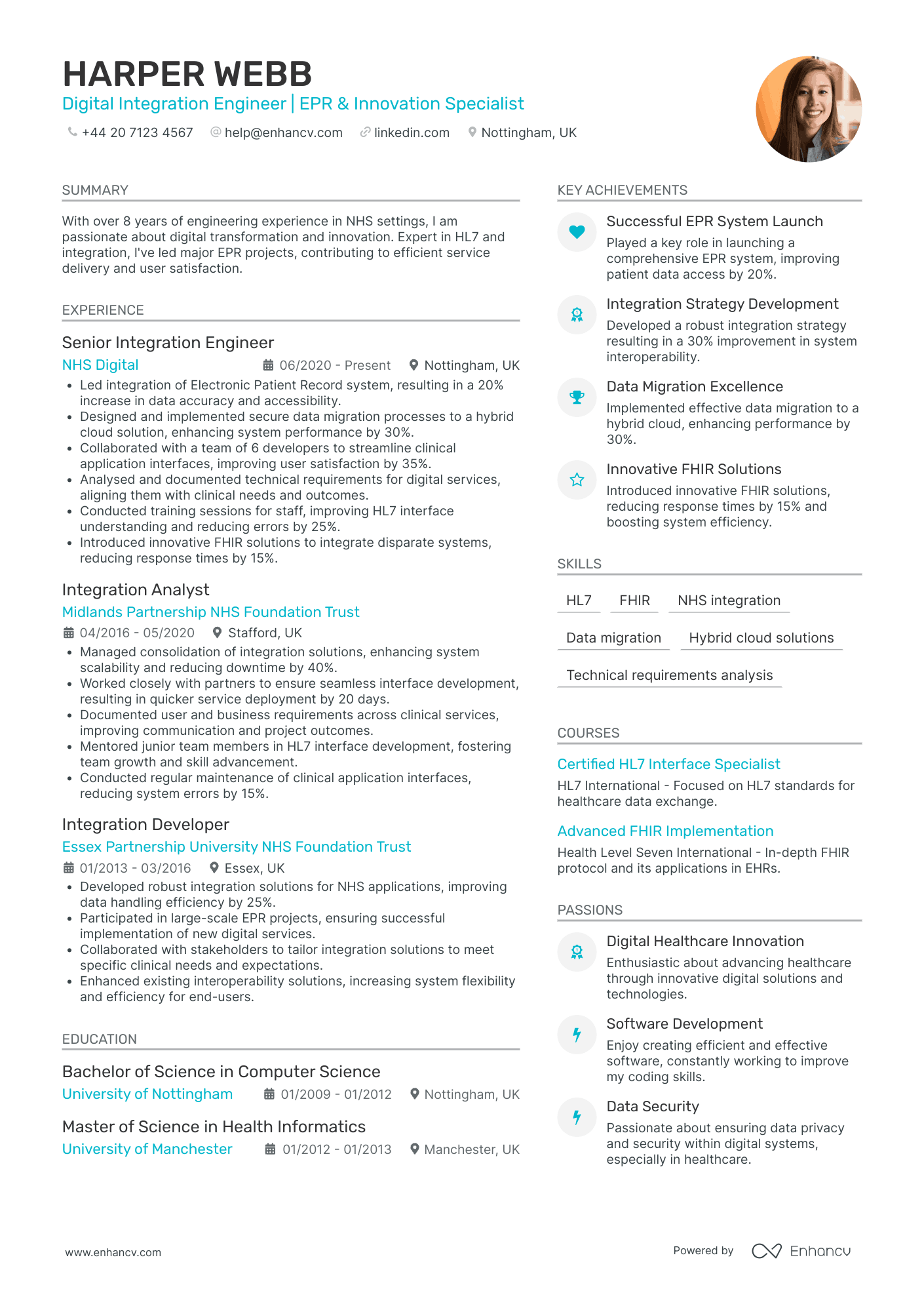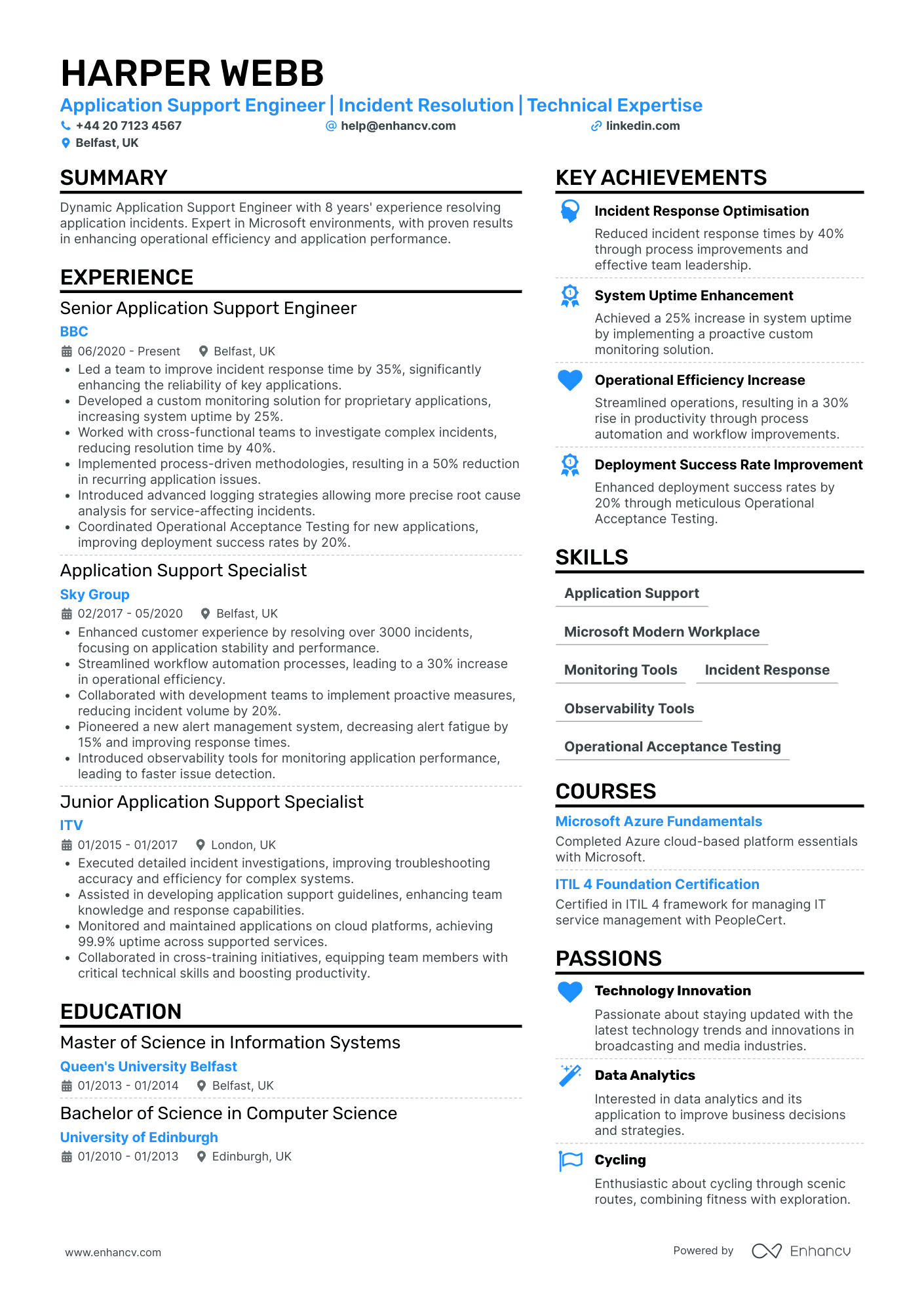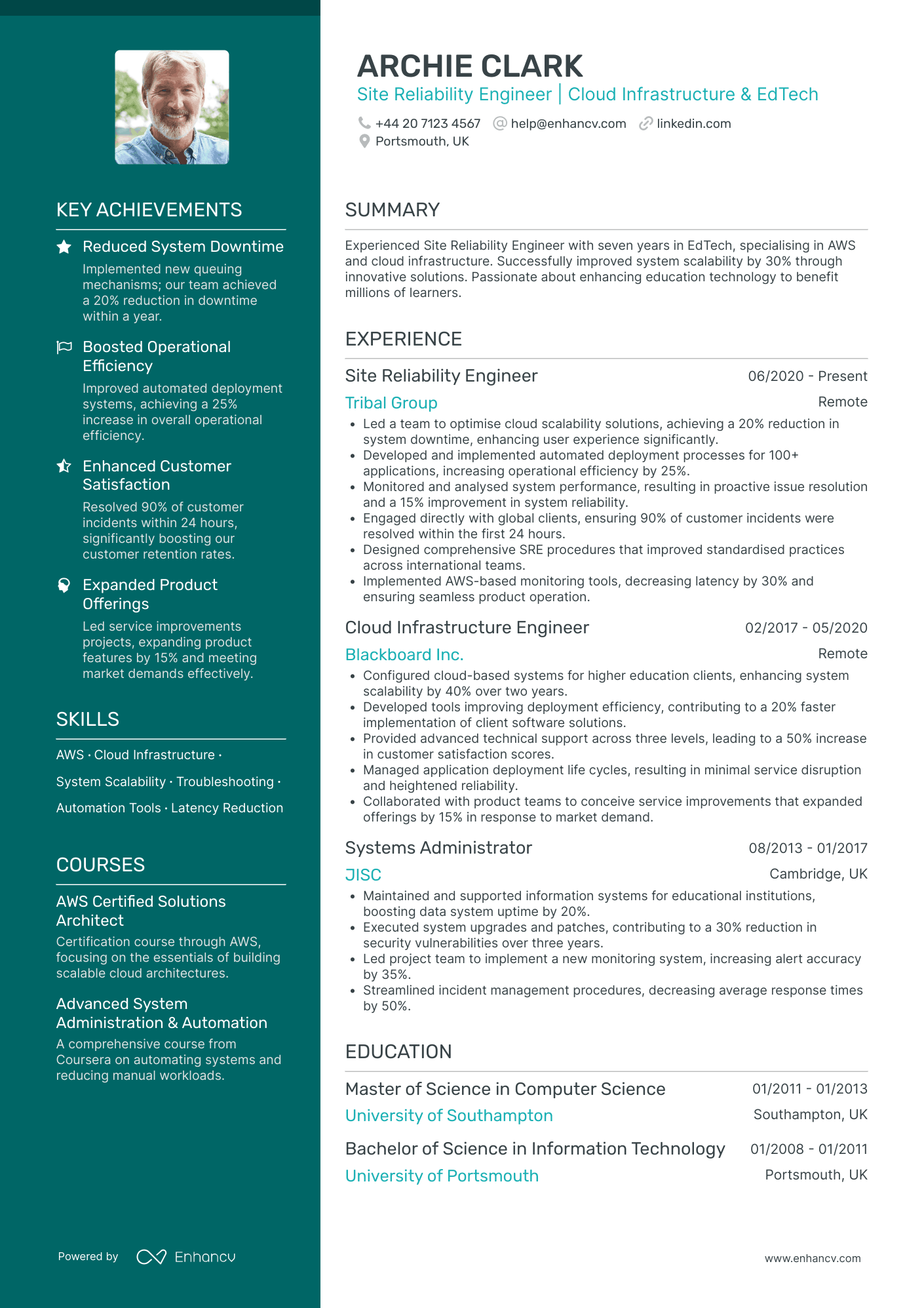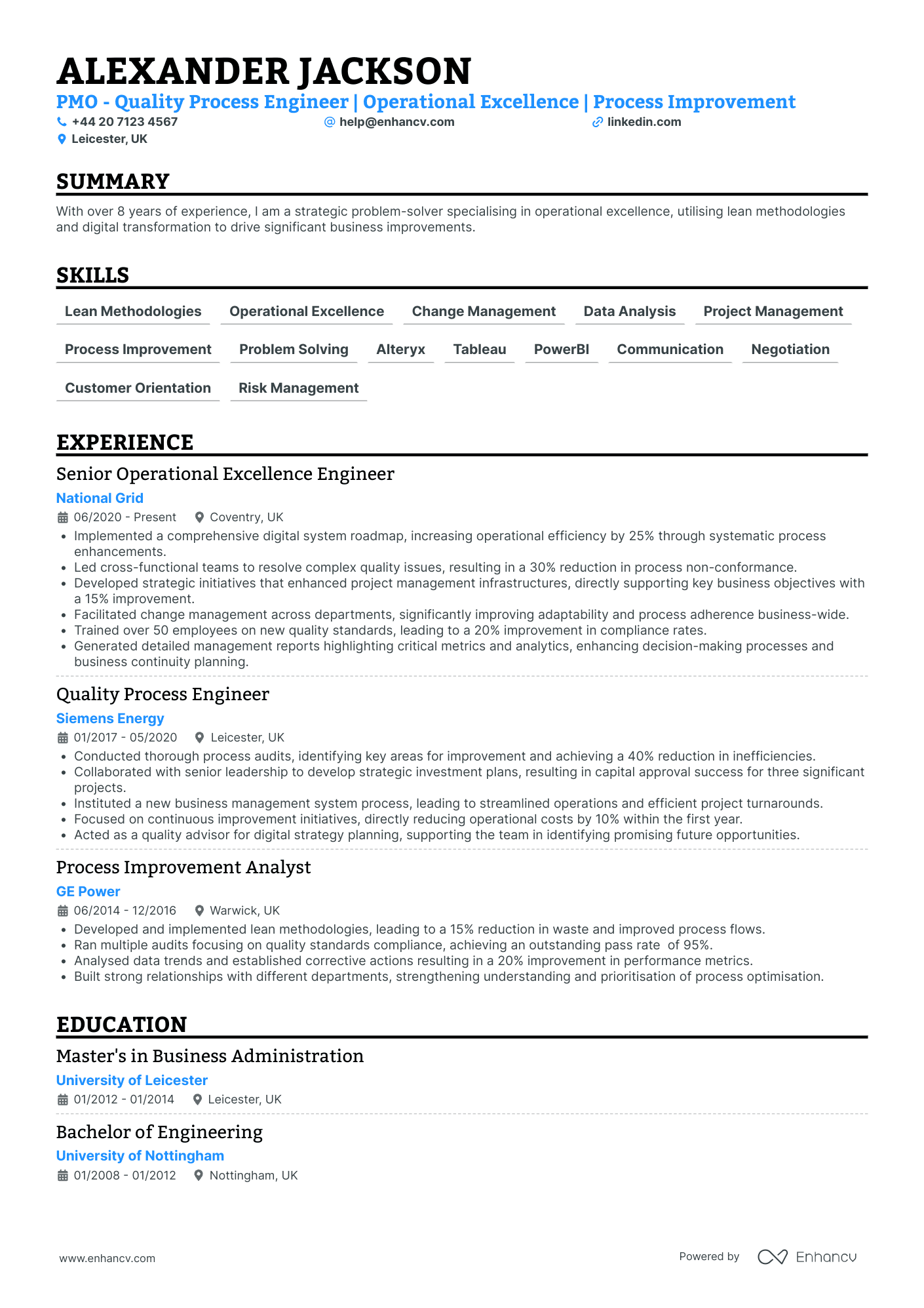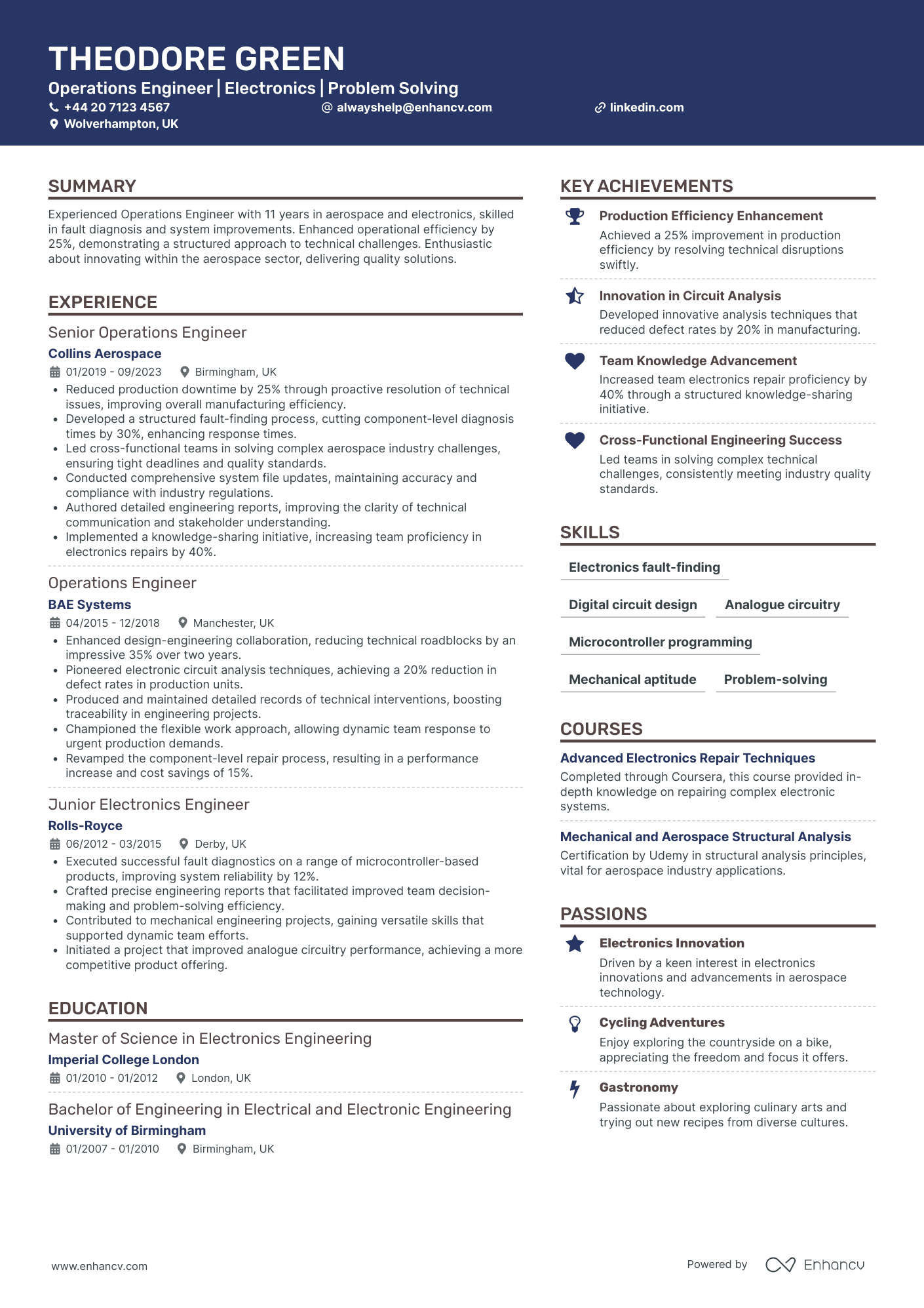Crafting a CV that succinctly encapsulates the complexity of project management and technical proficiencies can be a daunting challenge for a process engineer. Our guide provides tailored strategies and structured templates to effectively highlight your engineering expertise and project milestones, ensuring your skills shine through to potential employers.
- Applying the simplest CV design, so that recruiters can easily understand your expertise, skills, and professional background;
- Ensuring you stand out with your header, summary or objective statement, and a designated skills section;
- Creating your CV experience section - no matter how much expertise you have;
- Using real life professional CV examples to enhance the structure and outline of your profile.
If you still have no muse to write your professional CV, find some more industry-leading examples.
- Assistant Project Manager CV Example
- Agile Coach CV Example
- Construction Project Manager CV Example
- Program Manager CV Example
- Scrum Master CV Example
- Product Manager CV Example
- Project Coordinator CV Example
- Digital Project Manager CV Example
- Senior Project Manager CV Example
- Product Owner CV Example
CV examples for process engineer
By Experience
Senior Process Engineer
- Strategically Structured Presentation - Ava's CV is structured concisely with clear sections highlighting her career trajectory and expertise. Each segment is precisely crafted to emphasize critical experiences and skills, providing a streamlined narrative that effectively communicates her professional story.
- Strong Career Progression in the Water Industry - The CV demonstrates significant growth in Ava's career, moving from a Process Engineer to a Process Engineering Manager. This upward trajectory highlights her ability to take on increased responsibilities and expertly manage large-scale projects within the highly specialized water and wastewater treatment industry.
- Industry-Relevant Technical Mastery - Ava showcases expertise in water and wastewater solutions by listing advanced technical skills like P&ID Development and HYSYS. These resonate strongly with industry-specific demands, emphasizing her hands-on experience with tools crucial for process engineering roles.
Junior Process Engineer
- Career Trajectory and Professional Growth - Sophia Brooks' career trajectory showcases a natural progression from an intern to a Junior SIEM Engineer, highlighting a consistent focus on security and analytics. The transition from assisting in implementing SIEM platforms to directly improving threat detection rates at Cyber Security Solutions Ltd demonstrates her growth and increasing responsibility within the cybersecurity field.
- Achievements and Business Relevance - The CV effectively presents achievements with clear business impact, such as the 30% improvement in threat detection and 25% decrease in incident response time. These accomplishments not only emphasize Sophia's technical proficiency but also her ability to enhance the overall security posture and operational efficiency of the organizations she has worked for.
- Unique Industry-Specific Elements - Sophia's experience stands out through her expertise in advanced SIEM methodologies, such as developing correlation rules and integrating machine learning for threat detection. Her roles involve cutting-edge security practices and technologies, underscoring her deep understanding of the cybersecurity landscape and readiness to tackle complex security challenges.
Lead Process Engineer
- Effective Organizational Structure - The CV is organized into distinct sections that provide clarity and conciseness. Information is logically grouped, starting with key personal details and a succinct summary that immediately establishes professional credibility, and followed by well-defined sections like experience, education, skills, and achievements, allowing recruiters to easily navigate and digest the content.
- Progressive Career Development - Edward Mitchell's career trajectory shows clear advancement, moving from Process Engineer to Senior Process Engineer, then to Lead Process Engineer over time. Each role demonstrates increased responsibility and leadership, indicating a commitment to personal growth and an impressive capacity to take on more challenging projects across the refining and chemical industries.
- Technical Expertise in Safety and Efficiency - The CV emphasizes specialized industry methodologies such as HAZOP and LOPA protocols, showcasing Edward's technical depth and expertise. His role in optimizing processes, improving safety, managing engineering projects, and reducing costs exemplifies not just familiarity with industry tools but the ability to leverage them effectively for significant organizational benefits.
By Role
Process Safety Engineer
- Clear and Cohesive Structure - The CV is well-organized with clearly defined sections such as "Experience," "Education," "Skills," and "Achievements." This structure enables easy navigation, helping potential employers quickly find relevant information, like career progression and technical skills, critical for an engineering role.
- Demonstrates a Strong Career Trajectory - The candidate's career path shows growth and increased responsibility, starting from a Process Engineer role at ExxonMobil to a Process Safety Engineer at BP. This progression indicates not only an advancement in job titles but also a broadening of skills and expertise in safety management systems and project leadership.
- Expertise in Industry-Specific Methodologies - The CV showcases the candidate's proficiency in specialized tools and methodologies such as HAZOP, RCA, LOPA, and SIL, demonstrating a deep technical understanding that is critical in the chemical and process safety engineering fields. These tools are essential for driving safety improvements and ensuring compliance with industry standards.
Process Development Engineer
- Comprehensive Professional Growth - Oscar Evans' CV reflects a clear and logical career trajectory, showcasing progressive responsibility and complexity in roles within the water industry. From starting as a Junior Process Engineer to advancing as a Process Engineer at Mott MacDonald, the document outlines an impressive career path underscored by increased leadership responsibilities and impactful project outcomes.
- Emphasis on Industry-Relevant Achievements - The CV effectively highlights notable awards and recognitions within the industry, such as the "Innovation in Water Treatment Award" and "Health & Safety Excellence Award." These achievements are not just numbers; they are tied to substantial business impacts like a 40% improvement in water quality and a 25% reduction in workplace incidents, aligning Evans’ contributions with organizational success.
- Succinct Presentation of Key Skills - The concise listing of skills, including "Process Design," "Health & Safety Compliance," and "Sustainable Solutions," immediately communicates Evans' core competencies critical to process engineering. The structured presentation allows for quick assessment of qualifications, while the inclusion of courses and certifications further validates his technical expertise and ongoing professional development.
Process Control Engineer
- Structure and Clarity in Presentation - The CV is meticulously organized with clearly defined sections like experience, education, skills, and achievements, ensuring easy navigation and readability. Each section is concise, with bullet points used to highlight key accomplishments and responsibilities, effectively conveying the candidate's qualifications at a glance.
- Consistent Career Growth in Relevant Roles - Amelia Murphy's career trajectory is marked by steady progression within the power systems engineering sector, showcasing advancement from roles like Electrical Engineer to Control Systems Engineer. This not only highlights her growing expertise but also reflects a deepening specialization in high-voltage operations and safety management over time.
- Emphasis on Leadership and Mentorship - Throughout the CV, there is significant evidence of her leadership capabilities, particularly in mentoring junior engineers and establishing standardized reporting systems. This suggests her ability to enhance team performance and foster a collaborative work environment, aligning with her commitment to operational safety and efficiency.
Food Processing Engineer
- Strong Career Progression - Edward Mitchell's career trajectory shows a clear and steady progression, beginning from a Junior Process Engineer to an R&D Process Engineer, demonstrating growth and learning in each role. His movement between well-known companies within the food engineering industry suggests a breadth of experience and knowledge across different organizational practices and cultures.
- Industry-Specific Technical Expertise - The CV provides detailed insights into Mitchell's capabilities in applying technical methodologies such as process scale-up and food safety compliance, which are critical in the food engineering sector. His accomplishments in pilot processes and equipment optimization underscore his deep technical skill set necessary for the role of an R&D Specialist.
- Achievements with Significant Business Impact - The CV highlights substantial business relevance through Edward's achievements, such as a 20% improvement in operational efficiency and a 10% reduction in costs. These accomplishments not only showcase his ability to increase productivity but also emphasize his contribution to financial savings, affirming his role as a value-adding professional in the industry.
Bioprocess Engineer
- Structured clarity and effective detailing - The CV is well-organized into distinct sections, each concisely presenting relevant information. This clear structure ensures easy readability, allowing the reader to quickly ascertain key details about Isla King's expertise in biotechnology process development and scientific leadership.
- Progressive career advancement - Isla's career path showcases a clear upward trajectory, from a Bioprocess Engineer to a Lead Scientist. This progression not only reflects her growing expertise and responsibilities but also her ability to adapt to diverse roles within the biotechnology field, indicating strong professional development.
- Specialized technical prowess - The CV highlights significant proficiency in industry-specific tools and methodologies, such as AKTA systems and chromatography. This technical depth underscores her capability to significantly influence and lead process development projects, ensuring she remains a valuable asset in her field.
Process Design Engineer
- Structured Career Advancement - Daniel Baker's CV effectively conveys a well-defined career trajectory, demonstrating growth from a Junior Process Engineer to a Senior Process Engineer. The progression across reputable companies in the engineering field highlights a steady increase in responsibility and expertise, showcasing a commitment to professional development.
- Integration of Environmental and Safety Practices - The CV stands out by emphasizing Daniel's application of environmentally-friendly design solutions and a strong focus on health and safety. This includes initiatives like reducing environmental impacts by 20% and cutting health and safety incidents by 35%, which underscores his ability to implement industry-relevant sustainability and compliance measures.
- Diverse Range of Engineering Skills - The skills section presents a comprehensive array of technical proficiencies that are critical for a Process Engineer. It highlights not only essential engineering skills like AutoCAD and Design Documentation but also soft skills like Team Coordination and Project Management, indicating a versatile and holistic approach to engineering challenges.
Process Improvement Engineer
- Clear and Cohesive Structure - The CV is well-organized with distinct sections such as experience, education, and skills, which makes it easy to navigate. Each section is concise, providing essential information without overcrowding, which helps the reader quickly grasp key points.
- Impressive Career Progression - Evie Perry's career trajectory showcases a smooth progression through reputable companies like Airbus, Rolls-Royce, and Thales Group, reflecting both professional growth and her adaptability across various roles in the engineering industry. This advancement is indicative of her capability to take on more significant responsibilities and drive impactful changes.
- Focus on Measurable Improvements - The CV emphasizes achievements with quantifiable metrics, such as a 20% efficiency increase and a 25% reduction in production costs. This focus on concrete outcomes not only highlights the business relevance of Evie's contributions but also her ability to drive significant operational improvements.
Process Systems Engineer
- Strategically Organized Presentation - The CV is structured in a way that clearly prioritizes essential career information. With sections like summary, experience, education, and skills, it ensures the reader can quickly grasp the candidate's qualifications and achievements, maintaining a concise and logical flow.
- Consistent Career Growth and Industry Expertise - Oliver Smith’s career advancement from Systems Engineer to Senior Systems Engineer highlights a trajectory of growth and increasing responsibility in prestigious companies like Rolls-Royce and BAE Systems. This demonstrates both skill development and a strong commitment to the field of systems engineering.
- Industry-Specific Achievements with High Impact - The CV showcases specialized accomplishments in lifecycle management and assurance that are critical within the engineering and defence sectors. For instance, improving lifecycle management by 30% and compliance on high-stakes projects underscores his capability to deliver significant business value and technical excellence.
Process Validation Engineer
- Structured and Focused Presentation - The CV is presented in a clear and organized manner, demonstrating a logical flow through sections such as summary, experience, education, and skills. This structure facilitates easy navigation and ensures that the most critical information is quickly accessible to the reader.
- Progressive Career Development in Automotive Engineering - Evie Perry's career trajectory shows a clear progression from an Automotive Engineer at Rolls-Royce to a Senior Engine Validation Lead at Ford Motor Company. This consistent upward movement highlights her growth and adaptability within the automotive industry, underlined by increased responsibilities and leadership roles.
- Technical Mastery with Six Sigma and Hybrid Systems Expertise - The CV emphasizes industry-specific competencies, such as Evie's expertise in hybrid systems and proficiency in six sigma methodologies. Her use of advanced tools like MatLab and Concerto to enhance validation processes underscores her technical depth and problem-solving skills relevant to modern automotive engineering challenges.
Pharmaceutical Process Engineer
- Structured career progression - The CV demonstrates a clear and commendable career trajectory from Junior Mechanical Engineer to Senior Mechanical Design Engineer. Each role reflects increasing responsibility and specialization within the mechanical engineering field, particularly in the pharmaceutical and radiopharma sectors, showcasing the candidate's ability to advance and excel.
- Technical expertise in specialized fields - Rosie Gray's specialized expertise in radiopharmaceutical handling and GxP standards underscores a deep technical understanding of niche industry requirements. This focus on specialized skills pertinent to radiopharma and life sciences provides a distinctive edge, affirming the applicant's suitability for roles requiring specific industry knowledge.
- Quantifiable achievements and impact - The accomplishments section stands out by quantifying improvements in production efficiency, operational cost savings, and compliance success. Each achievement is aligned with business metrics, such as a 30% increase in manufacturing efficiency or a £500,000 annual cost saving, linking the candidate's contributions directly to measurable organizational impact.
Process Automation Engineer
- Clear Structure and Conciseness - The CV is organized with well-defined sections, allowing for an easy understanding of the candidate's background. Each section is concise yet informative, highlighting critical aspects of their career without overwhelming the reader with unnecessary details.
- Career Advancement and Growth - Freya Richardson demonstrates a clear career progression from QA Engineer to Senior Test Automation Engineer. This growth is marked by increasing responsibilities, such as leading teams and integrating advanced testing tools, showcasing her ability to evolve and take on leadership roles.
- Technical Expertise and Industry Tools - The candidate highlights proficiency in cutting-edge tools and methodologies such as Selenium, Cucumber, REST Assured, and AWS. Her expertise in Agile software development and continuous integration further sets her apart as a highly skilled professional adept at industry-specific practices.
Process Integration Engineer
- Effective Content Presentation - The CV is well-structured, with clear sections that facilitate easy navigation. Each entry in the experience section uses concise bullet points, making it simple to quickly grasp the accomplishments and responsibilities associated with each role. The consistent formatting across sections ensures a polished and professional appearance, enhancing readability and impact.
- Progressive Career Trajectory - Harper Webb’s career shows a clear growth path, moving from Integration Developer to Senior Integration Engineer. The progression through roles within the NHS highlights a focus on digital integration and system improvement, marking an impressive ascension in responsibility and expertise, and underscoring a commitment to long-term development within the healthcare sector.
- Specialized Industry Expertise - The CV emphasizes unique elements like HL7 and FHIR, foundational tools in healthcare IT, demonstrating Harper's technical depth and understanding of complex healthcare data systems. Additionally, the mention of certified courses and achievements related to integration and data migration indicates a thorough comprehension of the methodologies required for efficacious digital innovation within NHS settings.
Process Application Engineer
- Structured and Concise Content Presentation - This CV is efficiently organized, offering clear and succinct information in structured sections. Each section, from experiences to achievements, is clearly delineated, making it easy to navigate and understand. The use of bullet points ensures that critical details are highlighted without overwhelming the reader, enhancing the readability and flow of the document.
- Progressive Career Trajectory - Harper Webb's career growth is evident through his progressive roles within major companies such as ITV, Sky Group, and BBC. Moving from a Junior Application Support Specialist to a Senior status illustrates a significant upward trajectory, reflecting his capability to take on increased responsibilities and showcase leadership in the field of application support engineering.
- Specialized Technical Expertise and Impactful Achievements - The CV highlights Webb's technical prowess through the application of industry-specific tools like Microsoft Modern Workplace and cloud platforms. His achievements, such as reducing incident response times by 40% and improving system uptime by 25%, are backed by quantifiable metrics that underscore his ability to make substantial contributions to operational efficiency and reliability.
Process Reliability Engineer
- Structured and Concise Presentation - The CV is well-organized, with clearly defined sections such as experience, education, skills, courses, achievements, languages, and passions. This structured format allows for easy navigation, and each section is concise yet informative, ensuring that the essential elements of the candidate's background are easily accessible.
- Strong Career Growth in EdTech Industry - Archie Clark demonstrates a strong career trajectory, progressing from a Systems Administrator to a Site Reliability Engineer, particularly within the cloud infrastructure and EdTech domains. This growth reflects both his technical expertise and adaptability to evolving industry needs, making him a valuable candidate for roles requiring experience in cloud technologies and education technology.
- Technical Depth in Cloud Infrastructure - The CV emphasizes Archie's specialization in AWS and cloud infrastructure, showcasing unique industry-specific skills. His technical depth is demonstrated through achievements like implementing automated deployment processes and monitoring tools that significantly improve system scalability and reduce latency, reinforcing his expertise in optimizing cloud solutions.
Process Quality Engineer
- Structured and Concise Presentation - The CV is organized in a clear format, detailing each career phase and significant accomplishments succinctly. The use of bullet points helps in breaking down complex tasks and achievements, making it easily digestible for recruiters looking for key skills and experiences at a glance.
- Impressive Career Growth and Sector Experience - Alexander's career trajectory demonstrates a clear progression in roles and responsibilities, reflecting significant growth from a Process Improvement Analyst to a Senior Operational Excellence Engineer at National Grid. The evolution across prominent companies like GE Power and Siemens Energy illustrates both experience breadth and industry impact.
- Impactful Achievements with Business Outcomes - The CV stands out by connecting Alexander's initiatives to measurable business outcomes. For instance, achievements such as a 30% reduction in process non-conformance and a 25% increase in operational efficiency showcase the tangible benefits his contributions have brought to organizations, emphasizing both his strategic thinking and operational expertise.
Process Operations Engineer
- Clear and Structured Presentation - The CV is remarkably clear and well-organized, guiding the reader through logical sections such as experience, education, skills, and achievements. Each role is succinctly detailed with bullet points, effectively showcasing key responsibilities and accomplishments without overwhelming the audience with excessive text.
- Career Growth and Industry Focus - Theodore Green's career progression is evident, moving from a Junior Electronics Engineer to a Senior Operations Engineer within the aerospace sector. This trajectory not only highlights his professional growth and increasing responsibility but also his dedication to specializing in the aerospace and electronics industry.
- Technical Depth and Methodology - The CV demonstrates significant technical proficiency, ranging from advanced electronics repair techniques to microcontroller programming and avionics systems. These specific skills underscore his capability to handle intricate engineering challenges and contribute to industry advancements.
Structuring and formatting your process engineer CV for an excellent first impression
The experts' best advice regarding your CV format is to keep it simple and concise. Recruiters assessing your CV are foremost looking out for candidates who match their ideal job profile. Your white space, borders, and margins. You may still be wondering which format you need to export your CV in. We recommend using the PDF one, as, upon being uploaded, it never alters your information or CV design. Before we move on to the actual content of your process engineer CV, we'd like to remind you about the Applicant Tracker System (or the ATS). The ATS is a software that is sometimes used to initially assess your profile. Here's what you need to keep in mind about the ATS:
- All serif and sans-serif fonts (e.g. Rubik, Volkhov, Exo 2 etc.) are ATS-friendly;
- Many candidates invest in Arial and Times New Roman, so avoid these fonts if you want your application to stand out;
- Both single and double column CVs can be read by the ATS, so it's entirely up to you to select your CV design.

PRO TIP
Be mindful of white space; too much can make the CV look sparse, too little can make it look cluttered. Strive for a balance that makes the document easy on the eyes.
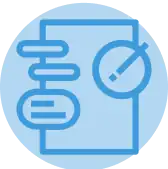
The top sections on a process engineer CV
- Objective statement highlights career goals, crucial for aligning with the company's needs.
- Process engineering experience showcases relevant projects and responsibilities, essential for job suitability.
- Technical skills section details specific process engineering tools and methodologies, vital for job proficiency.
- Education and certifications demonstrate formal qualifications and specialised training, important for credibility.
- Professional affiliations and memberships highlight active industry involvement, beneficial for networking and knowledge.

What recruiters value on your CV:
- Highlight your technical skills and process design capabilities by detailing specific engineering software proficiently used, such as AutoCAD, MATLAB or Aspen HYSYS, demonstrating your ability to design and optimise processes effectively.
- Showcase your problem-solving skills through examples of how you've implemented continuous process improvements or resolved complex engineering issues, solidifying your ability to enhance efficiency and productivity.
- Document your knowledge of compliance and safety by referencing specific regulatory frameworks you've worked within, such as ISO standards or specific industry regulations like those in the pharmaceutical or oil and gas sectors.
- Emphasise your project management experience by detailing projects you've led or contributed to significantly, mentioning budgets, timelines, team sizes, and outcomes to evidence your capability in seeing projects through from concept to completion.
- Articulate your communication and teamwork abilities, providing instances of collaboration with cross-functional teams, imparting your role in successful project delivery through effective coordination and clear communication.
Recommended reads:
Tips and tricks on writing a job-winning process engineer CV header
The CV header is the space which most recruiters would be referring most often to, in the beginning and end of your application. That is as the CV header includes your contact details, but also a headline and a professional photo. When writing your CV header:
- Double-check your contact details for spelling errors or if you've missed any digits. Also, ensure you've provided your personal details, and not your current work email or telephone number;
- Include your location in the form of the city and country you live in. If you want to be more detailed, you can list your full address to show proximity to your potential work place;
- Don't include your CV photo, if you're applying for roles in the UK or US, as this may bias initial recruiters' assessments;
- Write a professional headline that either integrates the job title, some relevant industry keywords, or your most noteworthy achievement.
In the next part of our guide, we'll provide you with professional CVs that showcase some of the best practices when it comes to writing your headline.

Examples of good CV headlines for process engineer:
- Senior Process Engineer | Lean Manufacturing Specialist | Six Sigma Black Belt | 12+ Years' Experience
- Chemical Process Engineer | Pharmaceutical Production Expertise | MEng Chemical Engineering | Chartered Engineer | 8 Years' Experience
- Junior Process Engineer | Continuous Improvement Enthusiast | MSc in Process Engineering | Graduate Member IChemE | 2 Years' Experience
- Process Design Engineer | Petrochemical Industry Focus | Professional Engineer (PE) | Project Management Professional | 10+ Years
- Lead Process Engineer | Water Treatment Projects | Environmental Compliance | BEng Civil Engineering | 15 Years' Experience
- Intermediate Process Engineer | Oil & Gas Sector | Process Simulation and Optimization | EngTech | 5 Years' Experience
What's the difference between a process engineer CV summary and objective
Why should it matter to you?
- Your process engineer CV summary is a showcasing your career ambitions and your unique value. Use the objective to answer why your potential employers should hire you based on goals and ambitions. The objective is the ideal choice for candidates who happen to have less professional experience, but still meet some of the job requirements.
Before you select which one will be more relevant to your experience, have a look at some industry-leading CV summaries and objectives.

CV summaries for a process engineer job:
- With over 7 years of dedicated experience in chemical engineering, an expert in process optimization and sustainable design, I have delivered a 20% efficiency increase in production at a leading pharmaceutical manufacturer, showcasing a deep understanding of complex chemical reactions and system integration.
- A results-driven mechanical engineer with a decade's worth of experience in the automotive industry, I have honed skills in CAD, thermodynamics, and project management, culminating in the successful redesign of a cooling system that cut production costs by 15% and improved performance metrics.
- Transitioning from a successful career in software development with a passion for environmental sustainability, I bring a unique perspective to process engineering. My extensive experience in problem-solving and algorithm design complements my recent postgraduate degree in Chemical Process Engineering from Imperial College London.
- Coming from an advanced materials research background, I am eager to apply my extensive knowledge of material properties and analysis techniques, including spectroscopy and electron microscopy, to a role in process engineering, contributing to the advancement of cutting-edge manufacturing processes.
- Seeking to embark on a career in process engineering, I am enthusiastic about utilizing my recent Master's degree in Industrial Engineering from the University of Leeds, where I specialised in process design and simulation. My objective is to develop innovative solutions to enhance production efficiency and quality.
- As a recent graduate with a strong foundation in chemical engineering principles and a fervent interest in renewable energy systems, I aim to leverage my academic knowledge and internship experience to contribute to the development of sustainable and efficient processes in a dynamic industrial setting.
Narrating the details of your process engineer CV experience section
Perhaps you've heard it time and time again, but, how you present your experience is what matters the most. Your CV experience section - that details your work history alongside your accomplishments - is the space to spotlight your unqiue expertise and talents. So, avoid solely listing your responsibilities, but instead:
- adverts' keywords and integrate those in your experience section;
- Use your CV to detail how you've been promoted in the past by including experience in the reverse chronological order.
Before you start writing your process engineer CV experience section, dive into some industry-leading examples on how to structure your bullets.

Best practices for your CV's work experience section
- Designed and optimised chemical processes for increased efficiency, resulting in a 15% reduction in production costs without compromising product quality.
- Managed a team of 10 junior engineers and technicians, fostering a culture of continuous improvement that increased overall team productivity by 25%.
- Developed and implemented a robust quality control system, which decreased the defect rate by 35% through careful statistical analysis and process adjustments.
- Conducted detailed process simulations using Aspen HYSYS to model plant operations, leading to process enhancements that improved throughput by 20%.
- Led the scale-up of pilot plant operations to full production level, ensuring seamless transition and achieving a 30% increase in production capacity.
- Authored a comprehensive process documentation guide to standardise operations, which became the foundation for training programs and improved compliance with regulatory standards.
- Integrated new waste reduction techniques into existing systems that resulted in a 40% decrease in waste output, enhancing environmental sustainability.
- Executed energy audit and re-engineered processes to utilise alternative energy sources, which cut down energy consumption and costs by 25% annually.
- Collaborated cross-functionally with R&D and manufacturing teams to refine product formulations and improve process flow, sustaining product integrity while boosting efficiency.
- Led the development and implementation of a continuous flow process, improving productivity by 20% for a high-volume chemical production line.
- Designed and executed a waste reduction program that decreased hazardous waste by 15%, significantly reducing environmental impact and saving the company £50,000 annually.
- Coordinated with cross-functional teams to deploy a new statistical process control system across 5 product lines, enhancing overall product quality and consistency.
- Optimized various petrochemical processes to improve yields by 10%, resulting in an estimated annual revenue increase of £1.2 million.
- Initiated and managed the upgrade of process simulation software, reducing project delivery times by 30% and improving simulation accuracy.
- Authored and revised technical documentation including P&IDs, process descriptions, and operating manuals to comply with latest industry standards, impacting over 200 internal stakeholders.
- Supervised the design and installation of a new £5 million distillation unit, increasing plant capacity by 40% and achieving enhanced purity in final products.
- Implemented Lean Six Sigma methodologies to identify inefficiencies, leading to a cost reduction of 25% in packaging materials without compromising quality.
- Collaborated with R&D to integrate a novel catalytic process into production which reduced reaction times by 50% and lowered energy consumption by 35%.
- Lead a digital transformation initiative by integrating IoT sensors and real-time analytics into production systems, delivering a 5% increase in operational efficiency.
- Developed a predictive maintenance program for major equipment that slashed downtime by 40% and extended machine life, leading to a saving of £80,000 per year.
- Piloted a new energy-saving technology that reduced the facility's carbon footprint by 30% and energy costs by £100,000 annually.
- Implemented a state-of-the-art flow chemistry system for API production, increasing throughput by 150% and significantly improving the safety profile.
- Managed a cross-departmental team to scale up a synthesis process from lab to pilot plant, achieving a 95% yield at scale compared to 80% in the lab.
- Streamlined production protocols that cut processing time by 20% and raw material use by 25%, bolstering the overall profitability of the product line.
- Directed the commissioning of a new assembly line for consumer products, cutting lead time by 15% and labor costs by 10%.
- Orchestrated a critical process equipment overhaul that increased production capacity by 30% and improved ergonomics for the workforce.
- Led training programs for 50+ operators and technicians in advanced process operations and troubleshooting techniques, elevating team competency and reducing error rates by 18%.
- Successfully reduced cycle time in beverage bottling line by redesigning workflow and automating critical steps, which increased output by 8000 units per hour.
- Drove the selection and procurement of a £2 million reactor system, achieving a significant improvement in reaction speed and product quality.
- Conducted a comprehensive review and optimisation of the plant's HVAC system leading to a 20% reduction in energy consumption and improved environmental control.
- Spearheaded a collaborative project with IT to implement a custom MES (Manufacturing Execution System), enhancing traceability and compliance for pharmaceutical manufacturing protocols.
- Conducted rigorous experimental designs to trial new methods of emulsion polymerization, which resulted in a patented process increasing reactor output by 25%.
- Organized the transition to a new raw material supplier for key feedstocks, maintaining production continuity and achieving a cost saving of 5% annually.
What to add in your process engineer CV experience section with no professional experience
If you don't have the standard nine-to-five professional experience, yet are still keen on applying for the job, here's what you can do:
- List any internships, part-time roles, volunteer experience, or basically any work you've done that meets the job requirements and is in the same industry;
- Showcase any project you've done in your free time (even if you completed them with family and friends) that will hint at your experience and skill set;
- Replace the standard, CV experience section with a strengths or achievements one. This will help you spotlight your transferrable skills that apply to the role.
Recommended reads:

PRO TIP
If you have experience in diverse fields, highlight how this has broadened your perspective and skill set, making you a more versatile candidate.
The CV skills' divide: between hard and soft skills
Of course, you may have read the job requirements plenty of times now, but it's key to note that there is a difference between technical and personal skills. Both are equally relevant to your job application. When writing about your skill set, ensure you've copy-pasted the precise skill from the job requirement. This would not only help you ensure you have the correct spelling, but also pass any Applicant Tracker System (ATS) assessments.
- Hard skills show your technological capabilities. Or whether you'll be a good technical fit to the organisation. Ensure you've spotlighted your hard skills in various sections of your CV (e.g. skills section, projects, experience) by including the technology and what you've attained;
- Soft skills pinpoint your personality and people or communication skills, hinting at if you'll easily accomodate into the team or organisation. Quantify your soft skills in your CV achievements, strengths, summary/objective, and experience sections. Always support your soft skills with how they've helped you grow as a professional.
Top skills for your process engineer CV:
Chemical process engineering
Process design and optimization
Process simulation
Piping and instrumentation diagrams (P&ID)
Computer-aided design (CAD)
Statistical process control (SPC)
Project management
Safety, health, and environment (SHE) management
Process equipment sizing
Six Sigma and Lean manufacturing
Problem-solving
Teamwork
Communication
Adaptability
Attention to detail
Time management
Critical thinking
Leadership
Project planning
Continuous learning

PRO TIP
If there's a noticeable gap in your skillset for the role you're applying for, mention any steps you're taking to acquire these skills, such as online courses or self-study.
Your university degree and certificates: an integral part of your process engineer CV
Let's take you back to your uni days and decide what information will be relevant for your process engineer CV. Once more, when discussing your higher education, select only information that is pertinent to the job (e.g. degrees and projects in the same industry, etc.). Ultimately, you should:
- List only your higher education degrees, alongside start and graduation dates, and the university name;
- Include that you obtained a first degree for diplomas that are relevant to the role, and you believe will impress recruiters;
- Showcase relevant coursework, projects, or publications, if you happen to have less experience or will need to fill in gaps in your professional history.

PRO TIP
Use mini case studies or success stories in your CV to demonstrate how your skills have positively impacted previous roles or projects.
Recommended reads:
Key takeaways
Here are five things you need to remember about writing your process engineer CV for success:
- Sort your experience based on the reverse chronological order, starting with your most recent career items, to showcase how you've grown your career;
- Include within your CV header your relevant contact details, a headline that could spotlight your unique value, and a photo - if you're applying for roles outside the UK or US;
- Decide to use the CV summary, if you happen to have more professional experience, and an objective, if you want to showcase your career goals;
- Within the experience section, write your bullets using action verbs, skills, and success, instead of just merely listing your on-the-job responsibilities;
- Prove your technical skills, using your education and certificates, and your soft skills, with your achievements and strengths sections.
